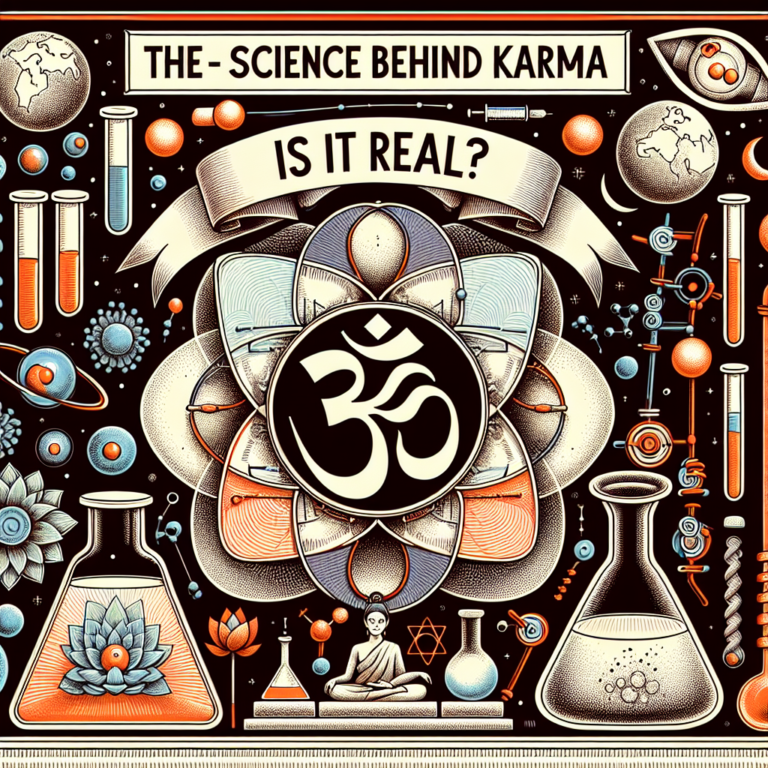Introduction
Karma is a term that evokes various interpretations and responses, resonating across cultures, philosophies, and belief systems. While traditionally associated with Eastern religions like Hinduism and Buddhism, the concept of karma has permeated worldwide thought, influencing modern spirituality, ethics, and personal responsibility. At its core, karma embodies the principle of cause and effect, suggesting that our actions—both good and bad—have consequences that reverberate through time.
This article seeks to delve deep into the essence of karma, exploring its historical roots, philosophical interpretations, parallels with scientific principles, implications in psychology and behavior, and its application in daily life.
Understanding Karma
Historical Roots
Karma is derived from the Sanskrit word ‘karman,’ which means action or deed. In Hindu philosophy, it is interwoven with the concepts of dharma (duty/ethics) and samsara (the cycle of life, death, and rebirth). The Bhagavad Gita, one of the most important texts of Hindu philosophy, emphasizes that individuals should engage in selfless action without attachment to outcomes.
In Buddhism, karma takes on a slightly modified perspective. While it still retains its essence of actions generating effects, Buddhism underscores the intention behind actions as pivotal in determining the karmic outcome. The Four Noble Truths present a framework indicating that suffering arises from desire and attachment, and right actions lead towards enlightenment, breaking the cycle of samsara.
The Philosophical Perspectives
As karma extended beyond its geographical roots, it encountered philosophical interpretations from Western thought. Western philosophies have debated the nature of morality, justice, and the universe’s interconnectedness. The concept of ‘moral cause and effect’ finds resonance in Aristotelian ethics, where virtuous actions are believed to yield virtuous outcomes.
Philosophically, the karma principle challenges the dichotomy of determinism and free will. Are we entirely responsible for our fates through our choices, or are we subjected to a pre-existing structure of karmic retribution? This question has sparked extensive discourse among philosophers, theologians, and scientists alike.
The Science of Cause and Effect
The study of cause and effect is integral to the scientific method. In this perspective, every phenomenon observed follows a chain of events dictated by natural laws. Einstein’s Theory of Relativity, for instance, demonstrates that actions can have consequences that ripple across time and space, akin to the karmic idea of actions leaving a lasting impact.
At a micro level, quantum mechanics reveals that particles interact in ways that are influenced by prior conditions. This notion coincides with karma, illustrating that all elements in the universe are interconnected, and one action can significantly alter the course of events.
Portraying karma scientifically necessitates the recognition that not every action has a direct, immediate correlation. The latency period between action and result can vary, and the complexity of interactions in systems—whether human, ecological, or cosmic—creates an intricate web of possibilities.
Psychological Implications of Karma
The Role of Intention
One of the key aspects of karma is the intention behind actions. In psychological terms, intention plays a vital role in shaping behavior. Research in behavioral psychology suggests that understanding the motivations behind actions can enhance empathy and moral reasoning.
When individuals act with benevolence, altruism, or compassion, the concept of "positive karma" reinforces neural pathways that support these prosocial behaviors. Conversely, negative actions without accountability can lead to feelings of guilt or shame, outcomes associated with adverse emotions.
The Feedback Loop of Actions
Psychologists often refer to the "feedback loop" in behavior theory, which aligns closely with the karmic concept of consequences. This feedback process involves actions producing results, and these results subsequently influencing future behavior.
For instance, acts of kindness often yield positive responses, creating an environment where altruism flourishes. The mutual reinforcement of positive actions leads to the establishment of stronger social bonds, community support, and a sense of belonging, reinforcing the idea of ‘what goes around, comes around.’
Karma and Mental Health
The principle of karma extends into mental health discourse. A focus on personal accountability and awareness of one’s actions can promote better mental well-being. One’s ability to acknowledge and learn from their actions can lead to personal growth, resilience, and transformation.
Therapies like Cognitive Behavioral Therapy (CBT) emphasize the connection between thoughts, actions, and outcomes. Recognizing the causality between negative thought patterns and destructive behaviors embodies the essence of karmic awareness, encouraging individuals to alter their mindsets and actions for improved life satisfaction.
Karma in Daily Life
Personal Accountability and Responsibility
Karma stresses the importance of personal accountability. Individuals are often more mindful of their actions when they recognize that these choices hold significant weight. This awareness fosters responsibility, encouraging individuals to think more critically about how they relate to others and the impact of their behaviors.
Interpersonal relationships benefit from this karmic lens as it promotes open communication and encourages conflict resolution. Individuals aligned with karmic principles are more likely to engage in generous acts, mitigate disputes, and cultivate harmonious environments.
Impact on Community and Society
When individuals internalize karmic principles, the effects ripple into broader societal structures. Communities practicing empathy, cooperation, and responsibility foster environments of support, enhancing overall social well-being.
Communities that acknowledge the interconnectedness of actions often invest in sustainable practices, care for the environment, and adopt inclusive policies. This aligns with the broader karmic narrative: healthy ecosystems yield healthy individuals, and vice versa.
Karma in Modern Spirituality
In contemporary contexts, karma is often romanticized or simplified, losing some of its philosophical rigor and depth. New Age movements frequently adopt the term to advocate for positive thinking and manifestations; however, the complexity of karma transcends mere optimistic outlooks.
Understanding karma as a dynamic interaction of cause and effect encourages individuals to live authentically and ethically, recognizing that genuine change stems from both intention and action. This notion asserts that while we cannot control every aspect of life, we can influence our destinies through conscious choices.
The Misinterpretations of Karma
The "Karmic Debt" Mentality
A common misunderstanding of karma is the perception of a "karmic debt" or punishment. This narrow interpretation frames karma as a system of cosmic justice that invariably punishes wrongdoers and rewards virtuous behavior. Such a perspective can lead people to view life’s challenges in terms of personal failure rather than opportunities for growth.
Adopting a blame-oriented viewpoint in interpreting karma can hinder personal development. A healthier understanding acknowledges that while one’s actions are significant, external factors, societal structures, and individual circumstances also contribute to life experiences.
Avoiding Toxic Positivity
Karma should not morph into an excuse for toxic positivity, wherein individuals ignore or downplay legitimate emotions and experiences. Life encompasses suffering, challenges, and complexities that are inherently human. While maintaining a positive outlook is essential, it is equally important to honor and process negative feelings and experiences.
Embracing the full spectrum of human experience allows for authenticity, vulnerability, and, ultimately, deeper connections with oneself and others.
Conclusion
Karma is a profound principle that transcends simplistic notions of reward and punishment. Rooted in rich philosophical traditions, it embodies the interconnectedness of actions and consequences through various dimensions: personal, social, and natural.
Incorporating an understanding of karma into modern life invites individuals to practice mindfulness, accountability, and conscious living. By recognizing the depth of this principle, we can foster more compassionate social structures, nurture mental well-being, and cultivate a more harmonious existence.
Ultimately, understanding karma as a science of cause and effect enables us to navigate life with intention and purpose, making choices that not only benefit ourselves but also contribute to the collective good. Embracing this ancient wisdom in the light of contemporary perspectives can lead to a richer, more meaningful experience of life.
Frequently Asked Questions (FAQs)
1. What is karma?
Karma is a spiritual and philosophical concept that describes the principle of cause and effect, where one’s actions—in thoughts, words, and deeds—lead to corresponding outcomes, positively or negatively, in the present or future.
2. Where did the concept of karma originate?
The concept of karma originated in ancient India, primarily associated with Hinduism and Buddhism, though it has resonated in various cultures and philosophical traditions worldwide.
3. Does karma represent punishment?
Karma is often misunderstood as punishment; however, it is more accurately seen as a natural law of consequences. While actions can have negative results, karma serves to encompass learning and growth through experiences rather than solely punitive measures.
4. How does intention influence karma?
Intention plays a crucial role in karma. It is not just the actions taken but the motivations and thoughts behind those actions that determine karmic outcomes. Positive intentions can lead to beneficial results, while negative intentions may generate unfavorable consequences.
5. Can I change my karma?
Yes, individuals can change their karma through conscious actions and choices. By acting with awareness, kindness, and integrity, one can create positive patterns that influence future outcomes.
6. Is karma scientifically validated?
While karma itself is a spiritual concept, parallels can be drawn with scientific principles like cause and effect, interconnectedness, and systems theory. Behavioral psychology also aligns with the karmic understanding of action and consequence, emphasizing personal responsibility.
7. How can I apply karmic principles to my life?
You can apply karmic principles by being mindful of your actions and their potential impact on yourself and others. Practicing empathy, accountability, and generosity fosters a positive karmic cycle that benefits both your personal growth and the communal environment around you.
8. What are some misconceptions about karma?
Common misconceptions include viewing karma as a linear system of rewards and punishments, underestimating the role of intention, and adopting a toxic positivity outlook that dismisses genuine struggles and emotions. Understanding karma’s nuances encourages a more balanced perspective on life’s challenges.
This elaborate exploration into the concept of karma serves to highlight its multifaceted nature and encourages a deeper understanding of individual actions and their interconnected effects. By embracing this wisdom, individuals can contribute positively to their lives and the world at large.
It seems like you might be looking for a specific type of prompt or assistance. Could you please provide a little more detail about what you need? Whether it’s writing prompts, questions, story ideas, or something else, I’m here to help!, #Karma #Unveiled #Science #Effect, #Karma #Unveiled #Science #Effect, 1734046833, karma-unveiled-the-science-of-cause-and-effect





